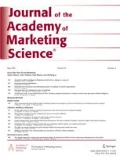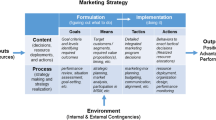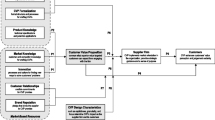Abstract
Although demarketing is widely offered as a potentially effective strategic response to the environment of economic shortages, empirical assessment of its application in either domestic or global markets is lacking. This paper explores the relationship between the incidence of economic shortages and demarketing activity performance in six African countries. The study results suggest the existence of several forms of shortage marketing environments which reflect different approaches to demarketing. The paper concludes with observations on methods firms employ to adapt their marketing programs in an environment of scarcity within seller-dominated economies.
Similar content being viewed by others
References
Akkah, I.P., K.Q. Dadzie and E.A. Riordan (1988). “Applicability of Marketing Concepts and Management Activities in the Third World.”Journal of Business Research Vol. 16, 2 (March): 133–148.
Becher, B.W., and P.B. Schary (1974). “Product Availability in an Age of Scarcity.” 1974 Combined Proceedings, R.C. Curham, ed., Chicago: (1980),American Marketing Association, 450–454.
Blankenship, A.B. and J.H. Holmes (1974). “Will Shortages Bankrupt the Marketing Concept?”MSU Business Topics, (Spring): 13–18.
Cavusgil, S. Tamer and Ugar Yavas (1984). “Transfer of Management Know how to Developing Countries: An Empirical Investigation.”Journal of Business Research. 12, 35–50.
Cravens, D.W. (1974). “Marketing Management in an Era of Shortages,”Business Horizons, 17 (February): 79–85.
Cullwick, D. (1975). “Positioning Demarketing Strategy,”Journal of Marketing, 39 (April): 51–57.
Douglas, S.P. and Craig, C.S. (1983).International Marketing Research, New Jersey: Prentice-Hall, Inc.
Dholakia, Nikhilesh and Ruby Roy Dholakia (1980). “Beyond Internationalization: A Broader Strategy for Marketing Pedagogy,” in Richard P. Bagozzi et al. eds.,Marketing in the 80’s: Changes and Challenges, AMA Educators Conference, 30–32.
Green, Paul E. (1978).Analyzing Multivariate Data, Hinsdale, Ill: The Dryden Press.
Hanna, N., A.H. Kizilbash, and A. Smart (1975). “Marketing Strategy Under Conditions of Economic Scarcity,”Journal of Marketing, 39 (January): 63–67.
Hollander, S.C. (1978). “Merchandise Shortages and Retail Policies,”MSU Business Topics (Summer): 27–33.
Kanuk, Leslie and Benson, Conrad (1975). “Mail Surveys and Response Rate: A Literature Review,”Journal of Marketing Research 12 (November): 440–453.
Kaynak, Erdener,Marketing in the Third World, New York: Praeger (1982).
Kelly, E.J. and L. R. Scheewe (1975). “Buyer Behavior in a Stagflation/Shortages Economy,”Journal of Marketing, 39 (April): 44–50.
Kjaer-Hansen, Max (1964). “Seller’s Market in the Light of Marketing Theory” in Max Kjaer-Hansen, ed.,Readings in Danish Theory of Marketing, Harch Farlag, Copenhagen.
Kotler, Philip (1974): “Marketing During Periods of Shortage,”Journal of Marketing, 38 (July): 20–29.
— and Sydney J. Levy (1971). “Demarketing, Yes, Demarketing,”Harvard Business Review, 49 (November–December): 74–80.
Little, Ian M.D. (1982).Economic Development: Theory, Policy and International Relations, Basic Books, Inc., New York: New York.
Loehr, William and John P. Powelson (1981).The Economics of Development and Distribution, Harcourt, Brace and Jovanovich, New York: New York.
McTavish, Ronald and Christopher A. Ross (1982). “Issues in Marketing Education in Developing Countries,”Proceedings, AMA Educators Conference, Chicago: 170–174.
Monroe, K.B., and A.A. Zoltners (1979). “Pricing the Product Line During Periods of Scarcity,”Journal of Marketing, 43 (Summer): 49–59.
Owen’s Business Directory and Travel Guide (1984).Owen’s Commerce, Trade and International Register, 886 High Road, Finchley, London, England.
Papadopoulos, Nicolas G. (1983). “Shortage Marketing: A Comprehensive Framework,”Journal of Academy of Marketing Science, 11 (Winter): 40–60.
Pride, William M. and O.C. Ferrell (1980).Marketing: Basic Concepts and Decisions, 3rd ed., Houghton Mifflin Company, Boston: MA.
Ross, Christopher A. and Ronald McTavish (1985). “Marketing in the Third World: Educators’ View.” Paper presented at a Conference in Scotland (August 28–31).
— and Ronald McTavish (1984). “The Marketing Task in Third World Countries,”Journal of Marketing Education (Spring): 20–27.
Shama, A. (1978). “Management and Consumers in an Era of Stagflation,”Journal of Marketing, 42 (July): 43–52.
Shapiro, S.J. (1978). “Marketing in a Conserver Society,”Business Horizons (April): 3–18.
Sorenson, O.J. (1978). “Marketing Theory and Marketing Management in Ghana,”Journal of Management Studies, 10, 2 (October): 102–119.
Author information
Authors and Affiliations
Rights and permissions
About this article
Cite this article
Dadzie, K.Q. Demarketing strategy in shortage marketing environment. JAMS 17, 157–165 (1989). https://doi.org/10.1007/BF02723374
Issue Date:
DOI: https://doi.org/10.1007/BF02723374




